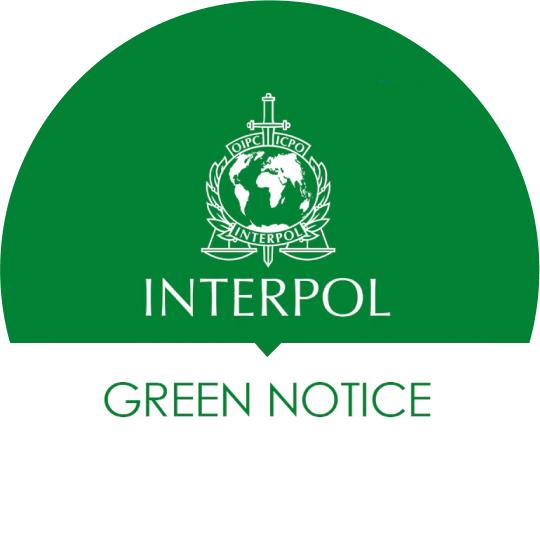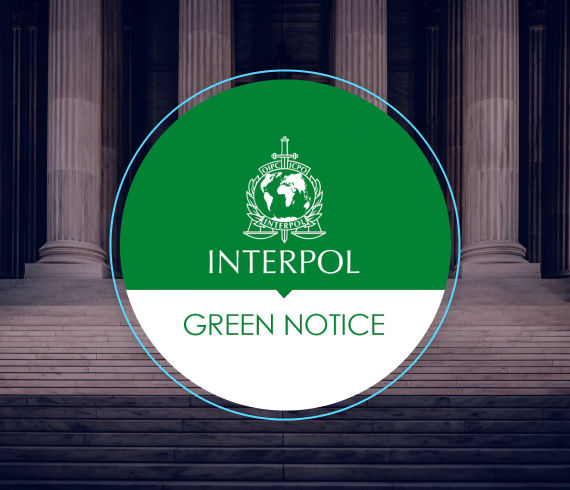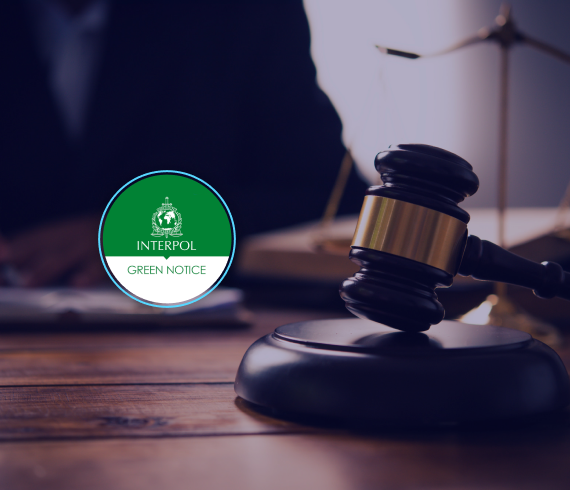
Interpol Green Notice
Interpol Green Notice is a request to provide information on a person’s identity, location, or activities in relation to a crime.
The Green Notice is not an arrest warrant or a request for extradition. Instead, it is a tool for law enforcement agencies to gather information and assist with investigations. The notice is circulated to Interpol member countries, who can then provide any relevant information to assist with the investigation.

The main function of the Green Notice is to locate and identify individuals who are involved in a criminal investigation, including suspects, witnesses, and missing persons.
The Green Notice is often used to gather information on individuals who have fled the jurisdiction where the crime occurred or who are believed to be residing in another country. It may also be used to locate victims of crime or individuals who can assist with an investigation.
Overall, the main function of the Interpol Green Notice is to facilitate international cooperation between law enforcement agencies and to help locate and identify individuals who are involved in criminal activity, ultimately contributing to the prevention and prosecution of crime.
Here is a simple table outlining key aspects of Interpol Green Notices:
| Aspect | Description |
|---|---|
| Purpose | To warn and share information about people who have committed crimes and are likely to commit them again in other countries. |
| Issued by | Interpol (International Criminal Police Organization) |
| Intended audience | Law enforcement agencies, immigration and border control authorities, and other authorized organizations |
| Access | Restricted to authorized organizations and law enforcement agencies; not available to private individuals |
| Reasons for issuance | To alert member countries about potential threats, prevent and suppress criminal activities, and promote international cooperation |
| Challenging or deleting | Consult an experienced attorney, gather relevant evidence, and submit a formal request to the Commission for the Control of Interpol’s Files (CCF) |
| Timeframe for CCF decision | Several months, depending on the complexity of the case and the volume of requests being processed |
| Legal assistance | Firms like Collegium of International Lawyers specialize in Interpol Green Notice cases and can provide expert guidance and representation |
Please keep in mind that this chart only gives a high-level summary of Interpol Green Notices. It is suggested that you speak with an experienced attorney or immediately contact the relevant authorities for more thorough information or to address particular issues.
How do I check my Interpol green Notice?

These notices are designed for use by law enforcement and other authorized institutions such as immigration and border control. If you feel you are the target of an Interpol Green Notice, you should take the following actions:
- Consult with Interpol lawyers: A lawyer with international criminal law knowledge can assist you in understanding the consequences of a potential Green Notice and advising you on the best course of action.
- Contact your local government: In some situations, you may wish to check with your local law enforcement agency to see whether any information regarding an Interpol Green Notice against you is accessible. You should be conscious, though, that this method may bring attention to oneself.
- Check with your country’s Interpol National Central Bureau (NCB): Each Interpol member nation has an NCB that serves as the point of contact for Interpol affairs. You can try to contact your country’s NCB for clarity on your status, however, they may not disclose specific information.
Remember that private individuals cannot access, see, or receive information on Interpol Green alerts since these alerts are designed for use by authorized organizations and law enforcement authorities. Always seek the opinion of a legal professional if you have any concerns.
How to delete/challenge Interpol green Notice?

If you feel that an Interpol Green Notice was issued against you in error or that it breaches your rights, you can dispute or request that it be removed by taking the following steps:
- Consult an experienced lawyer: Engage a law company that specializes in Interpol Green Notice matters, such as the Collegium of International Lawyers. They can advise you on the best course of action and walk you through the process.
- Collect relevant evidence: Gather any papers or information that you believe supports your argument that the Green Notice is erroneous, unreasonable, or violates your rights. This might contain judicial judgments, evidence of a mistaken identification, or other pertinent facts.
- Prepare a formal request: Your attorney will assist you in preparing a formal request to dispute or remove the Green Notice, describing the grounds for doing so and providing supporting documentation.
- Submit the request to Interpol: Your attorney will submit the request to the Commission for the Control of Interpol’s Files (CCF), an impartial organization charged with assessing and resolving complaints about Interpol alerts.
- Cooperate with the CCF: During the review process, the CCF may seek further information or clarification. Make certain that you and your attorney comply completely and quickly deliver any needed papers.
- Wait for the CCF’s decision: The CCF will evaluate your request and make a decision based on the facts you have supplied. This procedure can take many months, so be prepared for a possibly long wait.
- Follow-up: If the CCF rules in your favor, they will notify Interpol, who will then erase or alter the Green Notice as necessary. If the ruling is not in your favor, speak with your attorney about your alternatives and potential appeals.
Keep in mind that contesting or removing an Interpol Green Notice can be a complicated and time-consuming process. Working with an experienced attorney is critical to achieving the best possible result.
Collegium of International Lawyers: Expert Interpol Green Notice Lawyers

The Collegium of International Lawyers is a well-known law company that specializes in Interpol Green Notice proceedings. Our devoted and skilled legal team is committed to providing superior legal assistance to people who have received Interpol Green Notices. We work relentlessly to preserve our clients’ rights, traverse complicated international legal systems, and handle Green Notice concerns in a discrete and professional way. The Collegium of International Lawyers is your trusted partner in handling Interpol Green Notice problems, with a profound awareness of the worldwide law enforcement landscape and exceptional competence in international criminal law.
Green Notice vs other Interpol Notices
Interpol issues different types of notices to facilitate international police cooperation. The Green Notice is distinct from other Interpol notices in its specific purpose and nature.
Interpol Green Notice
- Purpose: The Green Notice is issued to provide warnings and criminal intelligence about persons who have committed criminal offenses and are likely to repeat these crimes in other countries.
- Content: It contains information about the person’s identity, modus operandi, and other relevant details to alert law enforcement agencies worldwide.
- Not an Arrest Warrant: It is important to note that a Green Notice is not an arrest warrant but serves as a warning to law enforcement agencies about a person’s criminal activities and potential threat.
- Scope: It is used to seek assistance in locating and identifying individuals who have committed criminal offenses or are of interest to law enforcement agencies for other reasons.
Other Interpol Notices (Red, Blue, Black, Yellow, etc.)
- Red Notice: It is used to seek the location and arrest of a person who is wanted by national jurisdictions for prosecution or to serve a sentence based on an arrest warrant or court decision.
- Blue Notice: It is used to collect additional information about a person’s identity, location, or activities in relation to a crime.
- Black Notice: It is used to seek information on unidentified bodies.
- Yellow Notice: It is issued to help locate missing persons, often minors, or to help identify persons who are unable to identify themselves.
- Other Notices: Interpol also issues notices such as Purple, Orange, and Silver for specific purposes related to criminal activities, missing persons, and identifying bodies.
In summary, while Interpol’s different notices serve various purposes in international police cooperation, the Green Notice is uniquely focused on providing warnings and criminal intelligence about individuals who have committed offenses and may pose a threat in other countries. Other notices, such as the Red, Blue, Black, and Yellow, serve distinct purposes related to locating and identifying individuals, seeking additional information, and facilitating investigations into specific criminal activities or persons.






